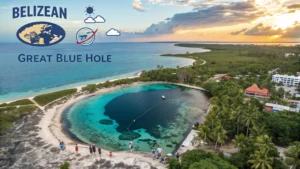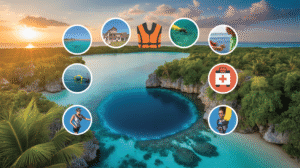Belize is recognized as a premier Caribbean destination, offering breathtaking views and unique experiences. However, it’s essential for prospective travelers to find a middle ground between indulging in Belize’s stunning natural beauty and adopting necessary precautionary measures to safeguard their well-being. This detailed guide provides the latest crime statistics, official government advisories, and firsthand accounts to empower tourists with the information needed to explore Belize’s magnificent beaches, vibrant jungles, and remarkable ancient ruins while emphasizing their personal safety.
1. Analyzing Crime Rates and Safety Trends in Belize
In 2024, Belize recorded a homicide rate of 21.7 per 100,000 residents, reflecting a minor increase from the previous year’s statistic of 21.5. Notably, however, there was a significant drop in homicides by 29 percent during the first half of 2025 when compared to the same period in 2024, with recorded cases decreasing from 58 to 41. The CompStat report published by the Belize Police Department shows an overall decline in major crimes by 9 percent, falling from 536 incidents in the first half of 2024 to 489 in the first half of 2025. This positive trend can be attributed to notable reductions in murder (–29 percent), robbery (–15 percent), and theft (–26 percent), suggesting improved safety for both locals and visitors.
| Crime Category | Jan–Jun 2024 | Jan–Jun 2025 | Change |
|---|---|---|---|
| Major crimes | 536 | 489 | –9 percent |
| Murders | 58 | 41 | –29 percent |
| Robbery | – | – | –15 percent |
| Theft | – | – | –26 percent |
2. Critical Government Travel Advisories for Safe Visits to Belize
- U.S. Department of State: Currently, Belize is classified as Level 2: Exercise Increased Caution due to the high occurrence of violent crimes, including sexual assault, home invasions, armed robberies, and homicide. Notably, the Southside of Belize City is marked as Level 3: Reconsider Travel—it is advisable to steer clear of non-tourist areas located south of Haulover Creek. Source: U.S. Department of State
- Government of Canada: Canadians are advised to exercise a high degree of caution throughout Belize, with specific recommendations to avoid non-essential travel to Southside Belize City due to ongoing gang-related and drug-related violence. Source: Government of Canada
- UK FCDO: The UK Foreign, Commonwealth & Development Office cautions that Belize has one of the highest murder rates globally per capita, largely driven by serious gang-related violence predominantly affecting the Southside of Belize City. However, other areas such as San Pedro, Caye Caulker, Placencia, and San Ignacio typically remain safer for travelers who exercise appropriate caution. Source: UK Foreign, Commonwealth & Development Office
3. Recognizing High-Risk Areas and Common Criminal Activities in Belize
- Belize City (Southside): This region is notorious for gang activity that significantly elevates violent crime rates. For personal safety, it is advisable to avoid non-tourist neighborhoods, particularly after sunset.
- Border Zones: Regions near the borders are witnessing increased smuggling and cross-border violence, especially with Guatemala, an important consideration for travelers.
- Petty Crime Hotspots: Areas such as San Pedro are known for incidents of pickpocketing and credit card fraud. Always ensure to shield your Personal Identification Number (PIN) when using ATMs and prefer using machines located within banks for added security.
4. Essential Safety Tips for Travelers Visiting the Beautiful Belize
Enhancing Your Personal Security While Traveling in Belize
- Stay alert: It is vital to avoid walking alone at night, particularly in urban centers like Belize City and Belmopan, where the risk of crime is considerably elevated.
- Protect your valuables: Always utilize hotel safes for important belongings and keep wallets and mobile devices out of sight to deter potential thieves.
- Be wary of spiked drinks: Never accept food or beverages from strangers, as this could lead to dangerous situations and compromise your safety.

Transportation Safety Guidelines for Secure Travel in Belize
- Road Conditions: Travelers should be aware that most secondary roads in Belize are unpaved and inadequately lit. It is advisable to drive only during daylight hours and ensure your fuel tank is always filled before embarking on longer trips.
- Public Transport Awareness: Public buses are often poorly maintained—it’s best to avoid them when possible. When using licensed taxis, remember they are not regulated by meters; thus, negotiate your fare upfront to prevent misunderstandings.
- Ferries Safety: When traveling between the cayes, ensure that life jackets are easily accessible and that the vessels are not overcrowded to guarantee safe travel.
Participating in Adventure Activities with Safety in Mind
- When engaging in adventure activities such as scuba diving, zip-lining, and cave tubing, always select reputable operators. Verify their safety records and equipment standards to ensure your safety; consider purchasing travel insurance that includes medical evacuation coverage.
- Only swim in designated areas; riptides are common, and lifeguards are often in limited supply, making it crucial to prioritize safety in aquatic environments.
Vital Health Precautions for Travelers to Belize
- Recommended Vaccinations: While there is no mandatory entry requirement for yellow fever, it is highly recommended to get vaccinated against hepatitis A, hepatitis B, typhoid, and rabies before traveling to Belize. For comprehensive information, refer to the CDC guidelines.
- Mosquito Protection: Given the year-round risk of diseases such as dengue, chikungunya, and Zika, it is essential to use EPA-approved insect repellent, wear long-sleeved clothing, and sleep under mosquito nets to minimize exposure.
- Water Safety Guidelines: Follow the rule of “boil it, cook it, peel it, or leave it” when it comes to food and drinking water. Carry oral rehydration salts to effectively manage traveler’s diarrhea and ensure you remain hydrated.
5. Important Considerations for Women, Children, and LGBTQ Travelers in Belize
- Women traveling alone should exercise additional caution to avoid isolated areas and poorly lit alleys, as there have been reported incidents of harassment in certain regions.
- Members of the LGBTQ community may encounter social stigma in Belize; it is advisable to refrain from public displays of affection to prioritize personal safety.
- Children traveling alone or with only one parent must possess notarized parental consent letters, as immigration officials in Belize strictly enforce this regulation.

6. How to Access Emergency Services and Consular Support in Belize
- In emergencies, always dial 911 for prompt assistance, whether it involves medical, fire, or police services in Belize.
- The U.S. Embassy located in Belmopan and the Canadian Honorary Consul in Belize City can offer assistance with issues such as arrests, detentions, or other emergencies. For further details, visit U.S. Embassy Belmopan.
- Ensure you register in your government’s traveler-registration program, such as STEP for U.S. citizens or the Registration of Canadians Abroad for Canadians, to stay updated and receive essential assistance.
Thorough Bibliography for Informed Travelers
- Belize Police Department’s CompStat report
- U.S. Department of State Belize Travel Advisory
- Government of Canada Travel Advice for Belize
- UK Foreign, Commonwealth & Development Office Advice
- CDC Traveller’s Health: Belize
- U.S. Embassy Belmopan
The Article Is Belize Safe to Visit? 2025 Complete Safety Guide for Smart Travelers appeared first on Belize Travel Guide
The Article Belize Safety Guide 2025: Essential Tips for Smart Travelers Was Found On https://limitsofstrategy.com



It’s fascinating to see the nuanced discussion around traveling to Belize, balancing the allure of its natural beauty with the need for safety. As someone who visited Belize last year, I can attest to the stunning landscapes and rich culture, but I also encountered moments that prompted me to remain alert.